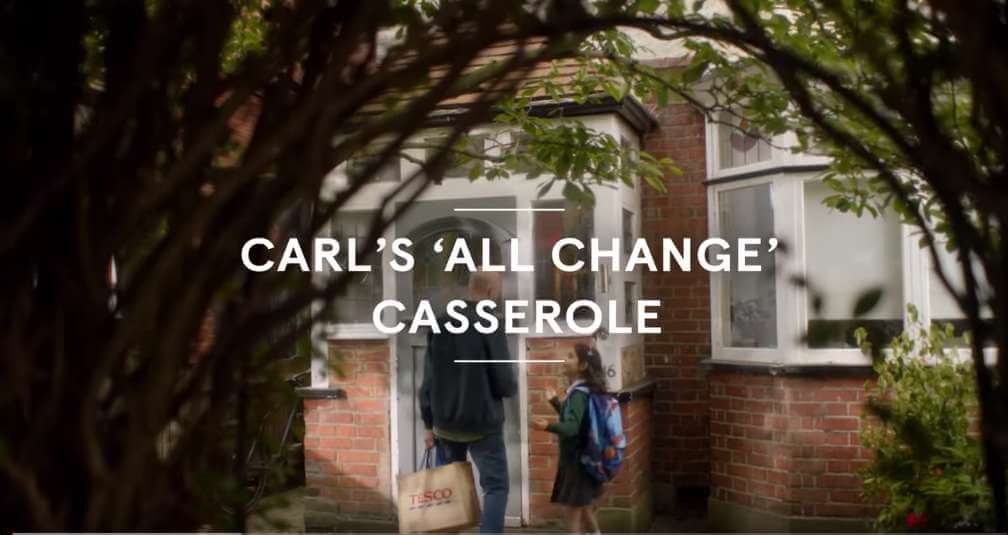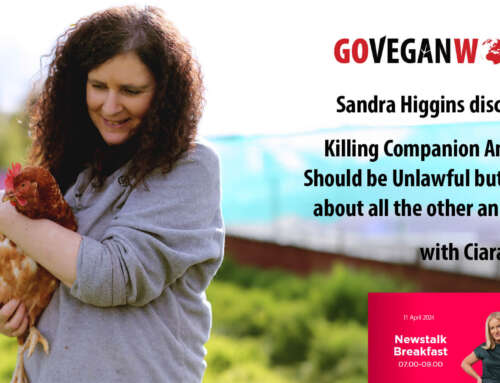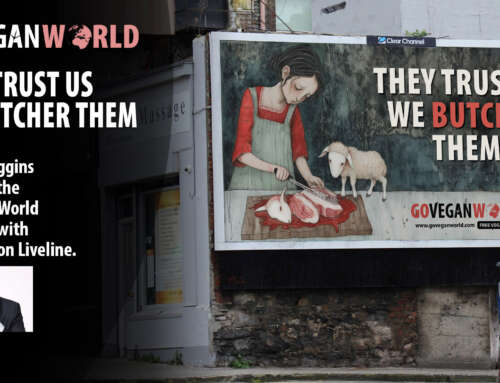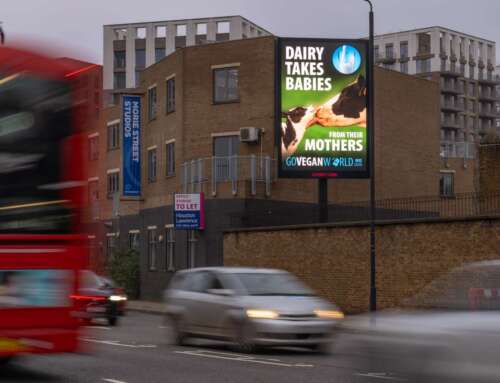Advertising Standards Authority Rejects Industry Complaints about Tesco Meat-Free Ad
The Advert
A number of weeks ago Tesco launched an advert on television and radio, in which a child of around 8 years old comes home from school to inform her Dad: “I don’t want to eat animals anymore”. To his credit, Dad acknowledges her views and cooks their usual casserole dish using animal-free sausages instead of the animal version.
The sausages used in the recipe are not only free of animal “meat” but are also suitable for vegans, however the word vegan is nowhere mentioned in the ad, and there is no indication that the child is also talking about eggs, dairy or anything else we use and kill other animals for. Indeed, there is no mention of killing at all. Nor does the ad mention those involved in using or killing other animals; the ad is not critical in any way of anyone involved in the food industry. Nevertheless, the animal-using industries reacted with outrage, including by complaining to the advertising regulator in an attempt to have the ad banned. That attempt, quite rightly, failed.
The Complaint
According to The Scottish Farmer, over 140 people involved in the animal-using industries complained to the Advertising Standards Authority (“ASA”), which regulates adverts in the UK, including on television and radio. They claimed the ad was:
“offensive and irresponsible as they used a child to promote a particular ethical viewpoint in an emotionally manipulative way, and because they could encourage children to reject meat without a full understanding of the implications of doing so”
and it
“implied eating meat was less healthy or moral than vegan or a plant-based diet”, and
“constituted an attack on the British meat industry.”
These complaints mirror accusations made in other industry statements. Following the ad’s release the National Farmers’ Union (“NFU”) complained to Tesco and issued a statement in which they claimed that the ad:
“has caused significant distress for British Farmers.”
“is demonising meat as a food group, which not only has negative connotations for farmers but also for the advocation of customers eating a healthy balanced diet.”
Elsewhere animal-using farmers claimed they were being “victimised.”
“Offensive”, “demonising”, “victimisation”, and an “attack on farming”, all from an ad that doesn’t criticise anyone or indeed any part of the food industry. Indeed, farmers will have grown the mushrooms, onions and peas used to make the sausages being promoted in the ad. Why such an over-reaction? It can only be because animals are mentioned. We see no equivalent reaction from animal-using industries to the regularly aired adverts for Quorn products, for example, but those adverts don’t mention animals. The Tesco ad is the only UK advert that we are aware of in which vegan food has been advertised with direct reference to the fact that animal products involve the consumption of animals. While that should be obvious, at least for animal meat or flesh, it is also something most people try not to think about, and something we as a society conspire to hide from children.
The animal-using industries depend upon the carefully crafted myth that animals are magically converted into the animal products we consume. Industry talks about “growing” and “harvesting” meat purposefully, to encourage us to forget that each animal we use and consume was a living-being who was violently slaughtered. Through careful marketing and manipulation, passed down from one generation to the next, the killing is pushed into the shadows, literally and in our minds. The survival of the animal-using industries depends upon it, and they know it. An advert that mentions that we are in fact eating animals is therefore, to industry, a shocking piercing of that myth and a threat to the survival of the animal-using industries.
Animal-using farmers are themselves often susceptible to the myth that separates animals from animal products. Usually not directly involved in killing the animals they use, they too can push what we do to animals in slaughterhouses to the backs of their minds. They too tell themselves it’s “not that bad” and “it’s necessary”, as otherwise they would have to acknowledge what they are complicit in. However, somewhere in the back of their minds they know when they send animals away from their “farm” to slaughterhouses that what will be done to them will be dreadful, that they will be terrified, that they will resist and struggle but ultimately be brutally slaughtered, that they do not deserve that, and that if it is true that we do not need to kill them in order to live ourselves, then it is deeply wrong. They live with that tugging away at their conscience every day, whether they realise or acknowledge it or not. No wonder then that they take the ad’s very mention of animals so personally, as it challenges the myth they operate within, reminding them as well as us of the slaughter, and of their role in it.
There are many examples of animal-using farmers who finally faced up to their internal conflict and stopped, for example UK farmers Jay Wilde (whose story is told in the short film 73 Cows) and Sivalingam Vasanthakumar and the farmers shown in the film Peaceable Kingdom.
Myths and Lies
Instead of accepting that increasing numbers of people are rejecting animal use and killing and recognising that adaptation will be essential, the animal-using industries choose to obstinately dig in their heels, hiring advertising companies to help them convince the public to continue to support animal use and killing by consuming animal products. Perhaps the most irresponsible and self-serving tactic is their insistence that humans need to consume animal products for health, in the face of qualified dietetics confirmation that this is simply not the case.
In its statement about the Tesco ad the NFU claimed:
“Meat as a food group provides naturally rich in protein and are a good source of iron, zinc and essential vitamins. There are certain parts of the population, especially teenage girls, who are currently not eating sufficient quantities of these micro-nutrients to fulfil their dietary requirement.”
“We believe it is vital that children do not establish misleading views of food groups, which may later affect their health and diets.”
In fact, animal meat is not a food group in the UK Eatwell Guide, the food group is protein and animal meat is only one potential source among others including beans and pulses. While there are deficiencies in certain nutrients among the general population, there is no evidence that people following vegan diets are more likely to be deficient. There is also, of course, a logical inconsistency in their reference to deficiencies in the general population, as the vast majority of the general population is not following a vegan diet, and so the deficiencies have arisen even although they consume animal products.
Farmers For Action’s Northern Ireland co-ordinator William Taylor went further, claiming:
“[Tesco is] jeopardising children and teenagers health by pushing veganism on them purely for profit.
Tesco needs to remember there are cases in the US where mum and dad have been taken to court and jailed for starving their children in ignorance.
“Parents of children under 21 need to remember that most of their parents did not permit or encourage them to go vegan whilst growing up, therefore, they should think very seriously about the real possibility of inflicting health issues on their children only to risk jeopardising their future in later life.”
“Tesco seems happy to risk people’s lives for the sake of profit!”
These baseless claims are shockingly irresponsible. Dietetics experts confirm that a vegan diet can be perfectly healthy at all stages of life (see for example this statement from the British Dietetics Association), which is also acknowledged by the NHS. In the face of that qualified advice, the groundless accusations that parents who feed their children a vegan diet are “jeopardising their health” and “inflicting health issues on their children” are reprehensible. It is unfounded allegations such as these that lead to vegan parents being unfairly criticised and pressurised by medical professionals and others to feed their children animal products when they are feeding them a perfectly healthy vegan diet.
There are of course terrible cases of neglect and abuse involving malnutrition among the general population, but again there is no evidence whatsoever that the incidence of this is higher among vegan families. What we have witnessed is a clear tendency in the media to focus on cases where there is a possible vegan angle, when the majority of malnutrition cases arise among the non-vegan population, and we generally find that on closer inspection of the facts the family was not vegan at all. Scaremongering with reference to courts and police is a desperate tactic by the animal-using industries, but it also has real-life consequences for vegan parents and children. Misrepresenting the scientific facts about our need to consume animal products, scaremongering and making baseless allegations about vegan parents as a group is irresponsible and immoral.
Unfortunately, many people are influenced by headlines, particularly on matters of health and nutrition. It is important to remember that the animal-using industries are not qualified dieticians with our health as their main concern, but profit-making businesses with a vested interest in persuading us to continue to buy their products. Let us hope then that the ASA rejection of the complaints about the ad reaches as many people as possible.
The ASA Decision
According to the Scottish Farmer, the ASA completely rejected the industry complaints about the ad. They report that the ASA advised the complainants:
“The council considered that the ads were intended to show that family meals could be easily adapted to accommodate plant-based diets. Whilst they acknowledged that some viewers might have found the use of a child expressing a point of view on such diets to be distasteful, they noted that a contrasting view was featured with the father expressing his love of meat.
Council also considered that parents would likely have a range of views about how to appropriately feed their children, and that the ads portrayed one example of that, without denigrating other valid opinions on the matter.
The Council added that the NHS has advised that sufficiently well-planned vegan diets are healthy and “The ads did not suggest that meat-free sausages should comprise the entirety of a child’s diet, nor did they endorse any other form of unhealthy dietary practice. Council therefore concluded the ads were unlikely to be considered offensive, harmful or irresponsible.”
A sensible decision recognising the qualified dietetics advice, that a vegan diet can be entirely healthy.
Conclusion
To suggest, in the face of qualified dietetics advice to the contrary, that we need to consume animal products for health is spreading falsehoods, including to children. Some supporters of the animal-using industries are quite open about their view that when children raise concerns about consuming animals we should convince them to continue using various myths and misrepresentations. The advert, in our view, depicts much better parenting than that, acknowledging that children have moral views.
Children have the right to accurate information, delivered in an unbiased way, yet the industries’ misrepresentations often make their way into our schools. It is not happenstance that the majority of the population wrongly believes that humans need to eat animal products to be healthy; it is because we have all gone through the same education. Vegan advocacy and vegan educational campaigns are challenging this miseducation, providing the information that is kept from our classrooms. More and more people, young through old, are realising that it is morally wrong to pay others to use and kill on their behalf.
Rather than descend further and further into the realm of lies and distortions in a vain attempt to sustain animal use and killing, which has no place in a fair and just society, these industries should instead put their time and energy into transitioning to ethical and sustainable food production, and lobbying governments to support them in doing so. Representative bodies for farmers should remember that they represent plant farmers. The NFU and others’ reaction to the ad, interpreting it as an “attack on farming” appears to completely forget about them. That is a very poor way to represent the hard-working farmers dedicated to producing food that is essential for human health, good quality plant food.
For more information on challenges to our educational advertising campaign see:
https://goveganworld.com/vegfest-london-october-2019/
https://goveganworld.com/advertising-company-refuses-to-run-vegan-ads-on-dublin-bus-and-irish-rail/
https://goveganworld.com/landmark-judgement-animal-rights/
https://goveganworld.com/landmark-ruling-for-tortured-laboratory-animals/






